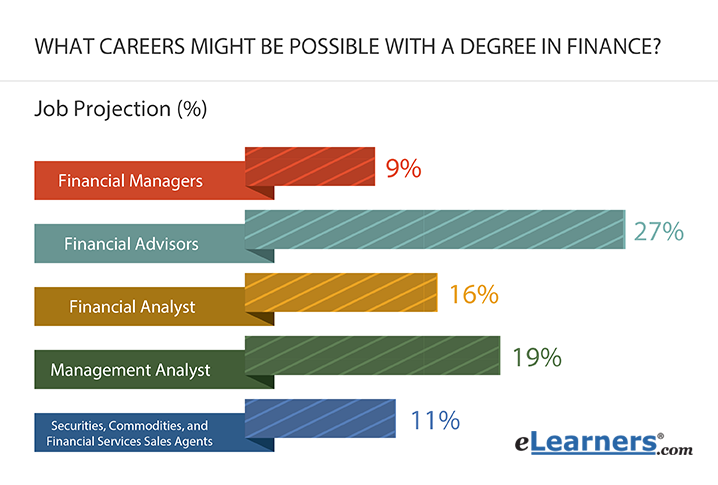A common question among prospective finance students is, “what do finance majors do?” A degree in finance can have a variety of potential outcomes. If you have finance questions or are wondering about career opportunities that may be available to finance degree holders, you’re not alone. Check out the frequently-asked questions below to learn more about exciting possibilities in this diverse field.
What do finance majors do?
Finance is essentially the science of money management, which means career paths in this field are widely varied. Finance majors typically find opportunities in one of three areas, which may overlap: public, corporate, and personal finance.[i] Professional roles may include Financial Advisor, Financial Manager, Banker, Salesperson, Controller, Budget Analyst, Loan Counselor, Chief Financial Officer, and many other careers related to money management, planning, risk prevention, and analytics.[ii]

Where do finance majors work?
Finance professionals may work in a variety of settings, from small banks to large financial corporations. Security and commodity brokerages, credit institutions, insurance companies, and government agencies are other potential employers of finance majors.[iii]
What finance career might be right for me?
One of the most common finance questions is, “What career path is the best choice for me?” Your professional path will depend on your personality, interests, and lifestyle goals; fortunately, the field of finance encompasses a wide range of career options. Outgoing finance majors who enjoy working with the public may thrive in roles such as Personal Financial Advisor, Sales Agent, or Loan/Credit Counselor. Those with highly-developed leadership skills could opt for a financial management track, which may include career opportunities like Bank Manager or CFO. Finally, independent and detail-oriented finance majors may excel in positions involving financial analysis or risk assessment, such as Budget Analyst or Actuary.
What finance certification do I need?
Finance certification varies by career track and may or may not be required prior to pursuing a new opportunity. For example, Financial Analysts have the option of pursuing Chartered Financial Analyst (CFA) certification from the CFA Institute, while Personal Financial Advisors could obtain Certified Financial Planner (CFP) certification. Typically, a minimum of a bachelor’s degree is required before pursuing certification, and several years of work experience may also be necessary. Research the requirements in your prospective career path to learn if certification is a necessary or recommended step for professional advancement.[iii]
What is the difference between a finance degree and an accounting degree?
The field of finance encompasses accounting, which often leads to confusion among students evaluating finance vs. accounting degrees. Accounting is a specialized area of finance that involves preparing, analyzing, and interpreting financial records and statements to collect information about past financial performance. Finance involves the management of assets, investments, and liabilities with a focus on future performance. While you’ll find some overlap in the topics covered, career paths vary for finance and accounting majors.
How can I learn more about careers in finance?
If you’re planning to earn a degree in finance, it’s important to fully understand the opportunities that may be available to you after graduation. Career aptitude tests can help you better understand your interests and strengths. After researching various finance careers that appeal to you, discuss your options with an instructor, guidance counselor, or mentor. Finally, talk to friends or relatives currently working in finance to get a variety of perspectives on this challenging and rewarding field.
[i]en.wikipedia.org/wiki/Finance [ii] onetonline.org/find/quick?s=Finance [iii] bls.gov/ooh/business-and-financial/financial-analysts.htm#tab-4 [iv] differencebetween.info/difference-between-accounting-and-finance
